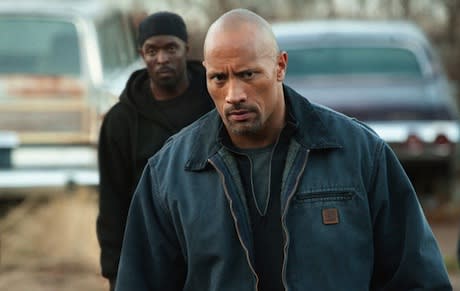Amidst the protracted special features included with the Blu-Ray of Snitch, stuntman-turned-director Ric Waugh passionately outlines his intentions and strategies with absolute unequivocal clarity. He wanted to make a "real" throwback to '70s action films when (he feels) scenarios were authentic and character interaction was authentic and sincere. To achieve this, he employed naturalistic lighting, a gritty and steely colour palette, an abundance of handheld camerawork and a reactive approach to action, wherein car chases are more about catching the fear and anxiety of the characters driving, seeing cars fly off the highway from the corner of their eye, than they are spectacle and distancing stunt work. And while this approach does add a visceral sensibility to later action sequences that usually isn't present in these sorts of throwaway thrillers, it's also the deepest, most complex element about a film that literally spells out its subtext on a title card at the very end. Said message is about the (supposed) injustice of an American criminal system that has harsh minimum sentencing on first-time drug traffickers in an effort to get them to "snitch" on bigger criminals. John Matthews (Dwayne Johnson) learns all about this — in a Wikipedia montage — after his son, who he hasn't been much of a father to, is set up by a friend and arrested for accepting an abundance of illegal narcotics with presumed intent to distribute. Playing against type, Johnson, while muscled, is out of his element in the drug world, relying on one of his employees from his construction business — ex-convict Daniel James (Jon Bernthal) — to introduce him to drug dealers (who live and pose more like movie drug dealers than the "real" ones Waugh wanted to portray). He's doing this to appease hardcore Republican attorney Joanne Keeghan (Susan Sarandon), whose anti-drug position in relation to her bid for congress has her scrambling to get a big bust, one that would allow John's son to go free. Waugh employs an abundance of paralleling to spruce up his mostly generic and astoundingly linear "true story," comparing the ersatz entrapment of John's son to the exploitation of non-gang members transporting drugs between geographic locales. While in moments of conflict, such as a cartel shootout or the aforementioned transport truck chase sequence, Snitch does have a kinetic, serviceable feel. It's just unfortunate that it repeatedly reverts to strained narrative devices like disapproving, interchangeable wives or overly dramatized inhumanities from a single-minded, reactionary judicial system in an effort to be a more substantive effort than it is. There simply isn't anything original or complicated about any of the characterizations or their interactions, making the ham-fisted didactics about murderers and rapists having lighter convictions than innocent young drug dealers seem almost laughable. While Waugh repeatedly mentions his intention to make the drug war seem like it was in the audience's backyard, his approach to unravelling that world — toothpick chewing gangsters and Benjamin Bratt with a Mexican accent — is quite superficial in relation to the reality he hoped to present. Of course, having this overly simplified understanding of a global infrastructure that, more often than not, leads back to terrorist financing likely explains why such a fuss is made about the current laws involving drug dealing.
(eOne)Snitch [Blu-Ray]
Ric Roman Waugh

BY Robert BellPublished Jun 14, 2013



